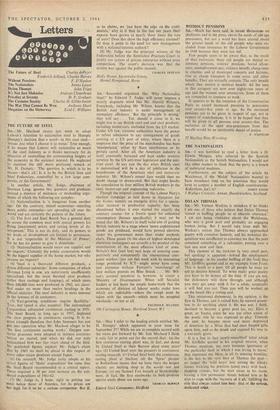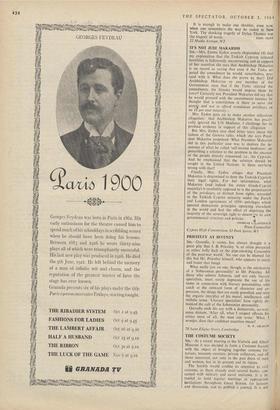DYLAN THOMAS SIR,—Mr. Vernon Watkins is mistaken if he thinks
I am one of those who believe that Dylan Thomas 'aimed at baffling people or at obscure utterance.' I am not being vindictive about the Welshman,, who was a good poet and probably an engaging human being. But I would take issue with Mr. Watkins's notion that Thomas always approached poetry with complete honesty, and his technical dis- quisition was insufficient to convince me that the poet remained something of a calculator, putting over a fast one now and then.
This element of the trickster (a very small part, but spoiling) is apparent—behind the employment of language in his jocular baffling of the fools that Mr. Griffiths quoted and in my example from Frost. This is death to a poet. Of all people he must try not to deceive himself. To write really great poetry you have to be honest all the time. If you are not, the dishonesty will show through, and although you may get away with it for a while, eventually it will find you out. Then you will be washed up on the beach like a rotting seal.
This occasional dishonesty, in my opinion, is the flaw in Thomas, and it ruined him; he seemed power- less to do anything about it. He was not, I think, destined to become a great poet (as, say, Eliot is great, or Yeats), since he was too often aware of the poetic role he was expected to play. Towards the end, he became more and more depressed at desertion by a Muse that had once heaped gifts upon him, and so he drank and capered his way to a too-early grave.
It is a line in that 'newly-unearthed' letter which Mr. Griffiths quoted in his original missive, when Thomas mentions 'my own tortuous ignorance of the particular dark in which I was trying to move,' that impresses me. Here, in all its winning humility, is the key to the very best of Thomas the poet— no longer the 'wild boyo' lost among the whisky fumes, trickling his precious talent away with back- slapping cronies, but the man alone in his room, leaving a few permanent shreds behind him as he tries to cope with the 'mystery of it all,' fulfilling the role that always suited him best: that of the serious, dedicated artist.
It is enough to make one shudder, even now, when one remembers the way he ended in New York. The shocking tragedy of Dylan Thomas was the tragedy of waste.















































 Previous page
Previous page